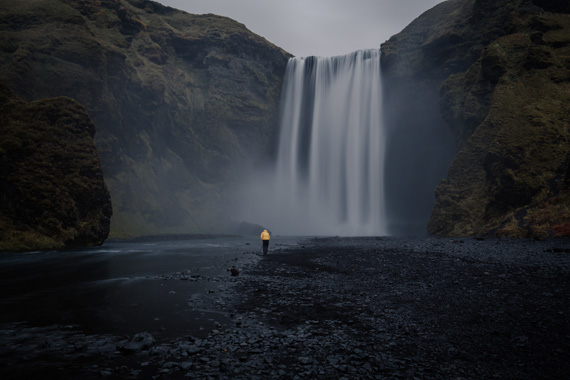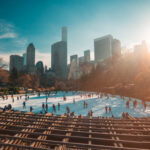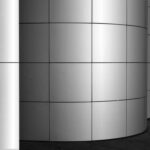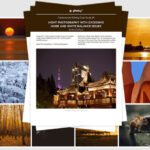In today’s photo tip, let’s talk a bit about color. Color can make or break an image, depending on how it is used. This article will discuss a color concept that is a big time compositional rule – but may be new to you… To get more engaging, better landscape photography – include people wearing “Kodak Yellow!”

Interesting side note on color: Did you know that the colors yellow, red, and orange are used in fast food restaurants because those are the colors that stimulate hunger?
Back to our photo tip…
We all know that putting people into landscape photography can make it more interesting and visually engaging to the viewer. People are simply more easily engaged by other people than by trees.
It’s human nature. As viewers we are hard wired to try to figure out what they are doing. It’s a survival thing.
But that is only true if they are seen!
Wide expanses of grass and trees (shades of green) can do a terrific job of camouflaging a person wearing green!
By the way, green is NOT a good color to have people wearing if you are doing outdoor portrait photographs. While I have seen photos of people wearing green that I loved, most any other color will work better.
When film ruled the day, Kodak film was – and still is – sold in little yellow boxes. That’s where the term “Kodak Yellow” came about.
Kodak yellow was just a catch phrase we used to remind us that when we insert people into our landscape photography, we need to have them wearing yellow!
Here’s another historical side note: Kodak film was much better at recording warm (yellow/red) tones. Fuji film (sold in green boxes) was better at the cooler greens and blues of landscapes!
All things being equal, we just matched up the color of the box to our subjects! It was an easy way to determine what type of film to use.
I’ve heard of photographers who will carry a selection of yellow windbreakers in their car, just so they can have people in their landscapes wearing them! It’s the only way to ensure you will get subjects wearing yellow if you are using “found” people and not professional models.
Consider this, if having the subjects wear Kodak yellow is important enough that top professional photographers consider yellow windbreakers as part of their camera gear…
Don’t you think that including subjects wearing yellow in our landscapes can move us one step closer to winning photo contests?
Don’t discount entering photo contests! The prizes can amount to thousands and thousands of dollars worth of camera gear, trips, cash, and can get you published! If you’ve been bitten by the photo bug, you are shooting anyway, why not enter?
Keep in mind – the color yellow contrasted with all the greenery of landscape photography, “POPS” out of the frame and immediately draws the eye into the composition! This is a big time compositional rule.
Here is an important photo lesson. Pay attention to ALL the details in your photography!
It’s all these little things that will separate you from the crowd and start making you a contest winner. Pay attention to color. Include people in your landscape photography and have them wear yellow. You might even consider including a yellow windbreaker or two as part of your camera gear.
About the Author:
Dan Eitreim writes for OnTargetPhotoTraining. He has been a professional photographer in Southern California for over 20 years. His philosophy is that learning photography is easy if you know a few tried and true strategies.
Like This Article?
Don't Miss The Next One!
Join over 100,000 photographers of all experience levels who receive our free photography tips and articles to stay current:






Kodak Yellow was NOT just a catch phrase, it was a carefully composed combination of yellow an red (maybe cyan) that was considered proprietary. When other companies copied the color for their own products, Kodak sued.
Thank you for the neat bit about Kodak Yellow. I never thought about it (or Fuji Green either). Is there an explanation available about using it in photo contests?
And, what happens to the result if one puts a yellow filter on the camera. I’m a novice and would like to learn if filters are useful for digital cameras (like my older Canon ESL)